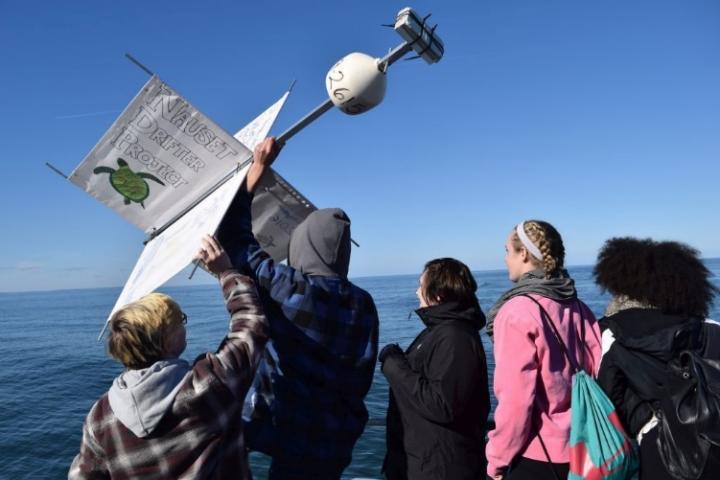Computer simulations help reconstruct ocean conditions behind stranding

Credit: Olivia Bourque
A computational analysis has surfaced new insights into the wind and water conditions that cause Kemp’s ridley sea turtles to become stranded on beaches in Cape Cod, Massachusetts. Xiaojian Liu of Wuhan University, China, and colleagues present these findings in the open-access journal PLOS ONE on December 4, 2019.
The Kemp’s ridley sea turtle is smaller and in greater danger of extinction than any other sea turtle in the world. This species is found in coastal waters ranging from the Gulf of Mexico to Nova Scotia, Canada. While Kemp’s ridley populations have slowly risen since conservation efforts began in the 1970s, the number of turtles found stranded on Cape Cod beaches in the last few years is nearly an order of magnitude higher than in earlier decades.
To help clarify the conditions that lead to stranding, Liu and colleagues combined computational modeling with real-world observations. This enabled them to investigate circumstances that could trigger hypothermia in Kemp’s ridley turtles–the primary cause of most strandings–and subsequent transport of the cold-stunned animals to shore.
The researchers used the Finite Volume Community Ocean Model to simulate ocean currents in Cape Cod Bay. To validate these simulations, they also released drifting instruments into the currents and tracked their movements via satellite. Then, they looked for links between the simulations, the drifter data, water temperature data, and records of where and when Kemp’s ridley turtles were found stranded.
The findings suggest that Kemp’s ridley sea turtles are more likely to become stranded at certain beach locations along Cape Cod when water temperatures drop below 10.5° Celsius and, concurrently, winds blow with high wind stress in certain directions. Once stranded, hypothermic turtles usually require assistance from trained volunteers in order to survive.
While these findings provide new insights that could help guide future search and rescue efforts, questions remain. Further research is needed to clarify the depth of water at which Kemp’s ridley sea turtles typically become hypothermic, and how processes like wind and waves may impact stranding events at those depths.
Co-author James Manning notes: “While the state-of-the-art ocean model can help simulate the process, both the student-built drifters and bottom temperature sensors deployed by local fishermen are critical to the investigation.”
###
Citation: Liu X, Manning J, Prescott R, Page F, Zou H, Faherty M (2019) On simulating cold-stunned sea turtle strandings on Cape Cod, Massachusetts. PLoS ONE 14(12): e0204717. https:/
Funding: Aside from a small in-house Northeast Fisheries Science Center outreach and education grant, most of this work was unfunded.
Competing Interests: The authors have declared that no competing interests exist.
In your coverage please use this URL to provide access to the freely available article in PLOS ONE: https:/
Media Contact
James Manning
[email protected]
Original Source
https:/
Related Journal Article
http://dx.




